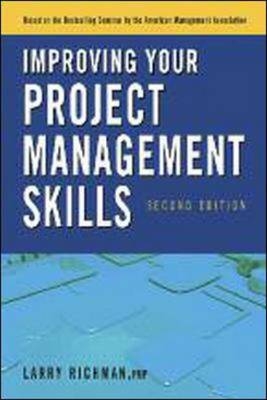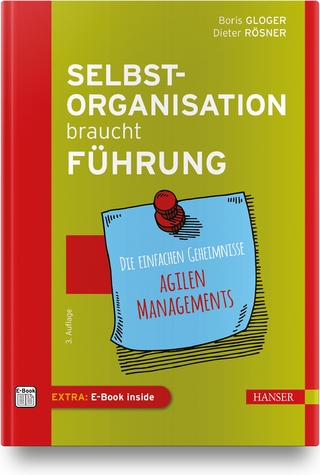
Improving Your Project Management Skills
Amacom (Verlag)
978-0-8144-1728-7 (ISBN)
- Titel ist leider vergriffen;
keine Neuauflage - Artikel merken
If a full-fledged project management course doesn't fit your schedule or your budget, check out the new edition of 'Improving Your Project Management Skills". Based on the hugely popular American Management Association seminar of the same name, this ultrapractical reference offers powerful and repeatable project initiatives that improve processes, streamline productivity, and cut costs dramatically. You'll get tools, tips, charts, lists, and never-fail advice for: planning and budgeting; defining project scope; project scheduling; implementation; performance measurement; leadership and staff issues; work breakdown structures; alignment with business goals; risk assessment and management; communication; and, project closure. Now completely revised and updated, the book is consistent with the most recent edition of "A Guide to the Project Management Body of Knowledge (PMBOK[registered])" and includes dozens of current practices and real-world examples. Equal parts learning tool and workplace reference, "Improving Your Project Management Skills" puts the power of a world-class project management seminar right in your hands.
Larry Richman (Salt Lake City, UT) is a certified Project Management Professional (PMP(R)) with more than 30 years of experience teaching and practicing project management.
Contents Introduction to the Second Edition 1 PART 1: PROJECT MANAGEMENT FOUNDATIONS 3 Chapter 1. The Core Concepts 5 Project Management Vocabulary 6 Why Project Management? 7 Classic Functions of Project Management 9 Processes in the Life of a Project 11 Knowledge Areas 12 PART 2: INITIATING 15 Chapter 2. Defining and Authorizing the Project 17 The Role of Stakeholders in the Authorization Process 18 The Business Case for Undertaking the Project 18 The Goal Breakdown Structure 21 Project Charter 24 PART 3: PLANNING 25 Chapter 3. Collecting Requirements and Defining Scope 27 The Five Processes of Project Scope Management 28 Collecting Requirements 30 Creating a Scope Statement 34 Example Scope Document 43 Chapter 4. Creating a Work Breakdown Structure 48 The Work Breakdown Structure Is an Outline 49 Considerations in Creating Work Breakdown Structures 50 The Work Breakdown Structure Is a Validation Tool 53 Work Breakdown Structures Are Flexible 55 Techniques in Creating Work Breakdown Structures 59 Verifying Scope 60 Controlling Scope 62 Chapter 5. Defining and Sequencing Activities 63 Defining Activities 63 Sequencing Activities Using Network Diagrams 64 Identifying Dependencies Between Activities 66 Defining Activity Relationships 67 Sample Network Diagram 70 Chapter 6. Estimating Activities 72 Using the Work Breakdown Structure 73 Steps in Estimating Activities 74 Estimating Methods 75 Guidelines for Estimating 77 Considering Risk in Estimating: Using Three-Point Estimates 82 Precision of Estimates 85 Duration-Based vs. Resource-Based Estimates 86 Building Contingency in Estimates 86 Improving Estimates over Time 87 Chapter 7. Scheduling Activities 89 Scheduling Activity Dates 90 Project Float 93 Accelerating Project Schedules 93 Chapter 8. Identifying Resources and Budgets 97 Identifying Resources 97 Balancing Resources 103 Creating a Project Budget 105 Chapter 9. Compiling the Major Components of a Project Plan 107 Project Charter 108 Project Scope Statement 108 Schedule Plan 109 Resource Utilization Plan 110 Budget Plan 110 Milestone Plan 110 Organization Plan 113 Risk Management Plan 114 Communication Plan 115 PART 4: EXECUTING, MONITORING, AND CONTROLLING 117 Chapter 10. Executing Projects 119 Project Kick-Off Meeting 120 Project Control 121 Project Meetings 121 Project Control Process 121 Monitoring Project Work 123 Collecting Project Information 124 Schedule Importance 125 Labor Hours 132 Data Analysis 132 Change Control 135 Sources of Change 137 Chapter 11. Monitoring and Controlling Projects 139 Establishing a Project Baseline as a Control Point 140 Measuring Performance: Earned Value Analysis 140 Chapter 12. Leading and Directing Project Teams 146 Leading Others 146 Directing Others 154 Managing Others 155 Conducting Meetings 155 Interviewing Others 159 Chapter 13. Managing Risk 164 Identifying Risk 165 Assessing and Prioritizing Risk 167 Responding to Risk 170 Acting on the Response Plan 172 PART 5: CLOSING 175 Chapter 14. Closing a Project 177 Project Closure: The Final Process 177 Ensuring Project Requirements Are Met 179 How Projects Can End 180 Administrative Closure 183 Contractual Closure 184 Initiating Project Closure 185 Lessons Learned 186 Finance and Administration Records 188 Performance Reporting 188 Staff Release 189 Appendix A: Learning Resources 191 Appendix B: Glossary 195 Index 208
| Erscheint lt. Verlag | 16.8.2011 |
|---|---|
| Verlagsort | New York |
| Sprache | englisch |
| Maße | 152 x 228 mm |
| Gewicht | 366 g |
| Themenwelt | Wirtschaft ► Betriebswirtschaft / Management ► Projektmanagement |
| Wirtschaft ► Betriebswirtschaft / Management ► Unternehmensführung / Management | |
| ISBN-10 | 0-8144-1728-0 / 0814417280 |
| ISBN-13 | 978-0-8144-1728-7 / 9780814417287 |
| Zustand | Neuware |
| Haben Sie eine Frage zum Produkt? |
aus dem Bereich


